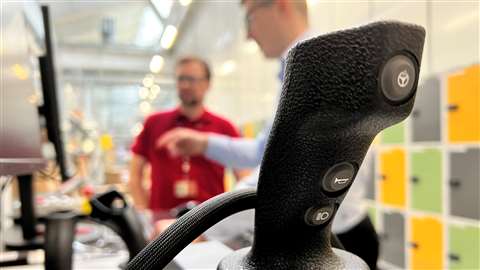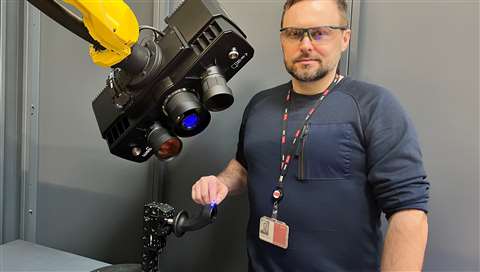Danfoss uses 3D technology to ensure joystick dimensions
22 July 2022
 The 3D scanner robot measures up to 12 million points on the component surface to create a 3D image, which can then be compared to the original CAD file. (Photo: Danfoss Power Solutions)
The 3D scanner robot measures up to 12 million points on the component surface to create a 3D image, which can then be compared to the original CAD file. (Photo: Danfoss Power Solutions)
Danfoss Power Solutions has invested in an advanced 3D scanner robot for its joystick manufacturing lines at its facility in Nordborg, Denmark. The device is being used to boost inspection routines by measuring component dimensions to micron-level precision.
Danfoss’ Nordborg facility manufactures thousands of joystick variants for off-highway vehicles, including forestry equipment, harvesters, cranes, tractors and others. Operators of the GOM 3D scanner robot can immediately determine whether a joystick component is within specifications.
Bringing this technology in-house eliminates the need to outsource time-critical metrology requirements to a third-party coordinate measure machine (CMM) technology provider, Danfoss noted in announcing the investment, saving time and providing greater in-house control over the manufacturing process. Third-party CMM technology will continue to be used for tasks in which speed is less critical.
 Grzegorz Leonhard, production technician, with Danfoss’ new 3D scanner robot. (Photo: Danfoss Power Solutions)
Grzegorz Leonhard, production technician, with Danfoss’ new 3D scanner robot. (Photo: Danfoss Power Solutions)
“The scanner is so fast and easy to use that we can literally verify component dimensions while we manufacture, which is not possible with CMM technology,” stated Abel Dukai, mechanical engineer in the Connect & Controls Solutions business unit in Nordborg, who is leading the 3D scanner project alongside production technician Grzegorz Leonhard. “We now know immediately whether part dimensions are 100% identical to the computer-generated design files, so the 3D scanner has taken our quality testing capability to a new level.”
The 3D scanner robot uses narrow-band blue light to measure up to 12 million points on the component surface within a few seconds to create a 3D image. This image can then be compared to the original CAD file.
According to Leonhard, the scanner offers precision down to 0.007 mm. “We are talking extreme accuracy,” he said. “And it can even scan highly complex shapes and forms. It’s incredible technology that’s already gaining prevalence in the automotive industry. I’m glad we now have it on board, too.”

